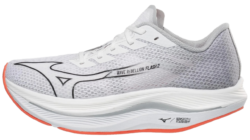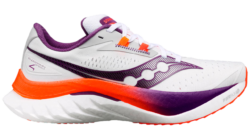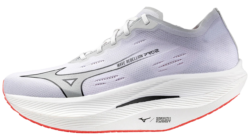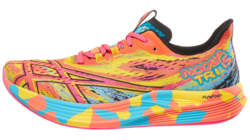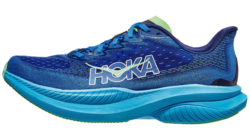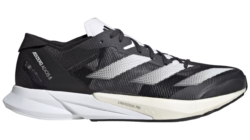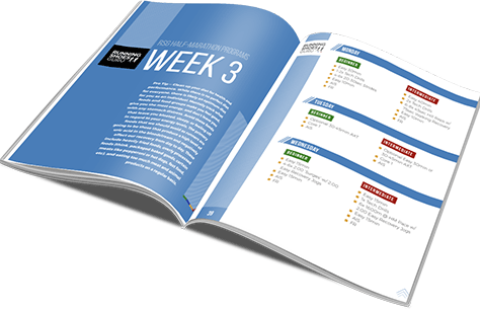Mizuno continues its heritage of creating racing flats with a smooth ride and a great deal of resilience with the Wave Ronin 4. Mizuno minimizes its Wave Technology to create their best feeling marathon flat yet, and fans of past versions of the Ronin will appreciate the small changes to the newest version.
First Impressions
For those who found the aesthetics of the Wave Ronin 3 to be a bit gaudy, the Ronin 4 is toned down quite a bit and looks fast. Mizuno got rid of a lot of the shiny yet rather useless graphics on the upper and sticks with a more traditional, yet still highly noticeable look. While maintaining the same 10mm heel drop Mizuno shaved off over an ounce for the Ronin 4 and at 7.2 oz this shoe is substantial enough for long distance racing and long speed/ tempo workouts. The Ronin runs a half size small and sizing up in this shoe led to a perfect fit.
Mizuno Wave Ronin 4 Upper
Japanese shoe companies have a history of creating shoes with wider toe boxes, sometimes referred to as an Asian last or Japanese last. This wider last really creates a more foot shaped toe box and a more accommodating upper in general. Putting on the Wave Ronin 4 for the first time I realized that by not tapering the toe box, a technique used on most racing flats, the Ronin creates a real sense of freedom for the forefoot. Coupled with soft and durable overlays made of synthetic leather sewn on and a very breathable dual density mesh, the toe box and overall fit of the Wave Ronin 4 is the best I’ve experienced from any racing flat currently on the market. While I don’t try them all on, I do get to most of them in a given year.
This great feeling toe box is complimented by a well fitting mid foot and snug heel, giving the shoe a really dialed-in fit that never felt restrictive or sloppy. A traditional lacing system with sparkly laces (I can’t wait until shoe companies get rid of the sparkles…Adidas, Nike, and Mizuno are the biggest culprits) and a thin but soft tongue didn’t put any undue pressure on the top of my foot. A thicker, more durable nylon mesh covers the back half of the shoe through the heel and seems very durable.
Mizuno Wave Ronin 4 Midsole
The midsole of the Ronin 4 feels like where Mizuno shaved off the most weight while managing to maintain a fairly well cushioned lightweight trainer/ racer. Consistent with the feel of Mizuno racing shoes, the feel is firm yet protective. Mizuno’s AP+ foam is most similar in feel to a Brooks or Adidas racing shoe and for runners looking for a softer, spongier feel, look elsewhere.
Mizuno uses a stripped down version of their wave thermoplastic unit in the heel to provide some extra cushioning. What I find is that these wave units mostly make for a smoother transition between heel to toe in their racing flats rather than providing a great deal of cushioning. The 10mm heel drop coupled with the wave unit makes this shoe a heel strikers racing flat. As a mid-foot striker I found that the forefoot cushioning was lacking comparatively.
Mizuno Wave Ronin 4 Outsole
The outsole stays essentially the same in the Ronin 4 from its last version, and for good reason. The forefoot is covered with a durable mesh fabric onto which small carbon rubber lugs are glued giving the shoe a great deal of sticky traction. I can’t attest to the durability of this outsole but with about 100 miles on mine none are missing and they show only minimal signs of wear.
The heel area features hard carbon rubber on the lateral side and the medial side uses more mesh with glued on shark fin shaped nubs. With a great deal of the plastic wave unit exposed Mizuno placed a strip of exposed softer EVA foam in the mid foot area to help with transition. I will say that this flat is exceedingly smooth, especially when heel striking.
Mizuno Wave Ronin 4 Overall Impressions
By decreasing the weight of the Ronin over an ounce, Mizuno places the fourth version of the Ronin as a viable competitor with other marathon racing flats such as the Adidas Adios 2 and Brooks Green Silence. Lovers of firm feeling racing shoes will love the ride of the Ronin 4 as will runners craving a wider toe box that doesn’t feel like a baggy upper.
The Ronin 4 could also be used as a trainer for a runner looking to transition into a more minimalist shoe. The one complaint that I have about the Ronin is that the forefoot cushioning seems a bit lacking at times. I found that after long tempo runs in the Ronin I was a bit more beat up than I should have been for a racing flat with this much protection. The one feature that I hope Mizuno continues to maintain through its line is the excellent fit of the Wave Ronin 4 which makes this shoe a must try in my opinion.
We thank the nice people at Mizuno for sending us a pair of Wave Ronin 4 to test. This did not influence our review of the shoe, written after running more than 100 miles in them.
Mizuno Wave Ronin 4 Price Comparison
This page contains affiliate links. As an Amazon Associate I earn from qualifying purchases.














